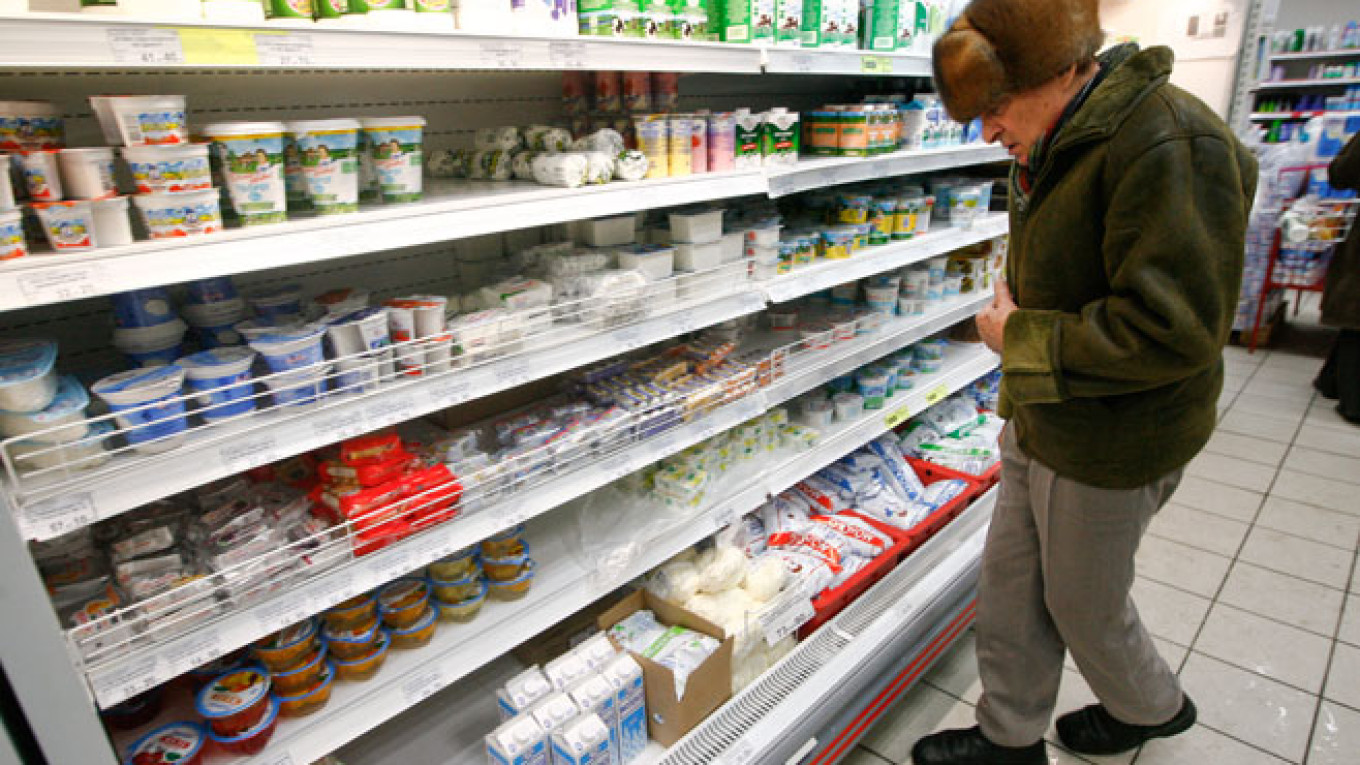Russia’s faltering economy appears to be edging shoppers into budget food stores, with two of the country’s biggest food retailers reporting a double-digit rise in sales over the third quarter last week.
Russia’s biggest food retailer Magnit, founded and co-owned by billionaire Sergei Galitsky, reported on Thursday a 21 percent growth of revenue in the first 9 months of 2014.
Second-biggest retailer X5 Retail Group said Friday that its revenue in the third quarter grew 23 percent year-on-year. The number of customers at its Pyatyorochka discount store rose by over 17 percent, the retailer added, while customers on average were spending almost 8 percent more on each visit.
Both companies, it seems, have inflation to thank for their higher revenues. Year-on-year inflation hit 8 percent in September, driven up by the plummeting value of the ruble and Russia’s bans on many food imports from the United States and European Union, according to data from state statistics service Rosstat.
But as analyst point out, the companies’ success may also be due to customers trying to economize as inflation combines with weak salary growth to push purchasing power down.
This conclusion was supported by a Nielsen survey on consumer behavior published Friday, which revealed that two-thirds of households in Russia began saving up in the last three months while a fifth of them spent less on food and groceries.
“We expect that consumers will switch to shops with lower prices, choosing in general discounters before more expensive supermarkets,” Marina Erskova, head of sales effectiveness practice at Nielsen Russia, wrote in comments to the survey.
The survey was conducted from the end of August to beginning of September this year in 22 major cities across Russia and included 1,100 respondents.
Consumers will also be more inclined to monitor special price offers and other promotional campaigns launched by retailers as means to save up on spending, she added.
But even as consumers lament their lower purchasing power, big retail chains are no doubt happy with the situation. For these wealthy companies, the crisis is an opportunity to muscle out smaller, less solvent competitors, said Maxim Klyagin, an analyst at Finam Management.
“Big chains can offer better deals [than smaller firms] by investing in their prices. They have enough resources to shoulder the burden of additional overheads and set the best price for their customers,” Klyagin said.
Because of their size and reach, large retail chains can also negotiate better deals and prices with suppliers, which compete to see their products on the shelves, said Natalya Kolupayeva, retail and consumer market analyst at Raiffeisenbank.
“The loser in this case is small business and regional stores, which do not have the option of better deals from their suppliers and cannot open new outlets, especially if their debt burden is high,” the analyst said, adding that this was the reason why large chains have edged out small retailers.
Magnit and X5’s ambitious expansion programs contributed to their revenue growth, Klyagin of Finam? Management said.
Both Magnit and Pyatyorochka have over the last nine months increased the number of stores they operated by 18 and 21 percent respectively. As of September 2014, Magnit operated over 9,000 stores while Pyatyorochka operated 4,300 stores, according to company press releases.
Contact the author at a.panin@imedia.ru
A Message from The Moscow Times:
Dear readers,
We are facing unprecedented challenges. Russia's Prosecutor General's Office has designated The Moscow Times as an "undesirable" organization, criminalizing our work and putting our staff at risk of prosecution. This follows our earlier unjust labeling as a "foreign agent."
These actions are direct attempts to silence independent journalism in Russia. The authorities claim our work "discredits the decisions of the Russian leadership." We see things differently: we strive to provide accurate, unbiased reporting on Russia.
We, the journalists of The Moscow Times, refuse to be silenced. But to continue our work, we need your help.
Your support, no matter how small, makes a world of difference. If you can, please support us monthly starting from just $2. It's quick to set up, and every contribution makes a significant impact.
By supporting The Moscow Times, you're defending open, independent journalism in the face of repression. Thank you for standing with us.
Remind me later.


